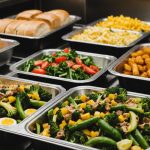Understanding the Zero-Waste Concept
Understanding the zero-waste lifestyle involves embracing sustainability and eco-friendly practices. At its core, zero-waste emphasizes reducing waste generation by rethinking product life cycles and consumption patterns. This concept aligns with the principles of refusing unnecessary items, reducing consumption, and reusing materials whenever possible. By integrating these eco-friendly practices, individuals can significantly contribute to a healthier environment.
Implementing zero-waste strategies in kitchen practices is particularly impactful. The kitchen often accumulates excess packaging, food waste, and disposable items. A zero-waste approach encourages using reusable containers, buying in bulk, and composting organic waste. These actions not only decrease waste but also promote a more sustainable lifestyle.
Also to read : Brilliant kitchen lighting: expert tips to reduce glare on surfaces for a perfect ambiance
The benefits of zero-waste are manifold, spanning both environmental and personal health. By reducing household waste, fewer pollutants enter landfills and oceans, ultimately safeguarding biodiversity. Additionally, using non-toxic materials and sustainable products in the home can enhance personal well-being. Opting for zero-waste practices contributes to a healthier planet while fostering responsible consumer habits. Achieving these goals requires mindfulness and dedication, but the rewards for the environment and individual health make the effort worthwhile.
Assessing Your Current Kitchen Setup
To embark on the journey of a zero-waste lifestyle, begin with a thorough kitchen assessment. Start by meticulously evaluating current waste generation patterns in your kitchen. This involves examining what items are frequently discarded, such as excess packaging or food scraps, and determining their sources. Organise your kitchen strategically by categorising items into groups for reuse, recycle, or discard. This process helps in recognising areas needing improvement.
This might interest you : Transform your kitchen into a serenity sanctuary: expert design tips for boosting mental well-being and relaxation
Consider waste management techniques, such as setting up designated bins for different types of waste—organics, recyclables, and landfill items. Organisation is key to maintaining an efficient, eco-friendly kitchen. Identifying what can be reused or recycled minimises the need for waste disposal, reducing your overall ecological footprint.
Additionally, evaluate current storage solutions and think about how to optimise them for sustainability. Prioritising reusable storage containers over single-use options is a simple yet effective change. By assessing your kitchen setup, you can identify how organised areas contribute to less waste and greater efficiency. Regular evaluations and reorganisation support the continuous improvement of sustainable practices, fostering a more eco-friendly environment for everyone involved.
Waste Reduction Strategies
Implementing waste reduction strategies in the kitchen is crucial for a more sustainable lifestyle. Start by reassessing your kitchen habits and aim to minimise waste at every stage. One effective method is composting. Instead of discarding vegetable peels and food scraps, create a composting system. Composting transforms organic waste into nutrient-rich soil, reducing landfill contribution and benefiting your garden.
Incorporate comprehensive recycling practices for items like plastics, metals, and glass. Ensure that each type of recyclable is correctly sorted and cleaned before disposal, aiding in effective recycling efforts. Familiarise yourself with local recycling guidelines to maximise the process’s impact.
For further waste minimisation, embrace practical tips such as buying in bulk to decrease packaging waste. Consider items with minimal or recyclable packaging, and bring reusable bags to stores. Evaluate your purchasing habits by prioritising quality over quantity, opting for long-lasting kitchen supplies.
Another way is to plan meals ahead to avoid food spoilage. When cooking, use the entirety of ingredients and create new meals from leftovers. This reduces food waste and encourages creative culinary practices. By integrating these strategies, cultivating a zero-waste lifestyle becomes achievable.
DIY Projects for an Eco-Friendly Kitchen
Creating an eco-friendly kitchen doesn’t have to be costly or complicated. DIY kitchen projects are an engaging way to incorporate sustainability while adding a personal touch. Simple projects like making reusable beeswax wraps and cloth napkins can significantly reduce dependence on disposables. Beeswax wraps are great for covering food without plastic, while cloth napkins replace paper ones, decreasing waste.
Upcycling is another exciting avenue to explore. Transform old jars into stylish storage solutions or convert used fabrics into tote bags. These projects not only repurpose items but also promote creative thinking. Customized storage solutions, such as hanging shelves or magnetic spice racks, can also help reduce clutter and make the kitchen more organised.
Involving the whole family in these DIY projects can make the transition to an eco-friendly kitchen enjoyable and educational. Such activities teach valuable skills and foster a collective commitment to sustainability. By dedicating time to these creative endeavours, kitchens can become more efficient and environmentally friendly spaces, paving the way for a genuine zero-waste lifestyle. These fun projects are invaluable steps towards nurturing sustainable habits.
Engaging the Whole Family in Zero-Waste Practices
To embed the zero-waste lifestyle into daily routines, engage the entire family, making sustainability a collective effort. Start by involving kids in fun, educational activities that introduce them to eco-friendly practices. For instance, team up to create a composting system together, allowing children to learn about food cycles and the importance of reducing waste.
Education plays a critical role in fostering sustainable habits. Host family discussions on the principles of zero-waste, using accessible language to explain why these efforts matter. Share information about the environmental impact of everyday actions, emphasising how small changes can lead to significant improvements.
Make the transition enjoyable with fun activities that promote eco-friendly behaviour. Conduct themed challenges, such as a week-long no plastic use, or set up a points-based system rewarding eco-conscious efforts. Such initiatives not only enhance involvement but also sustain motivation.
Create opportunities for children to participate in kitchen organisation. Encourage them to help with sorting recyclables or coming up with creative ways to repurpose items. Including everyone in the journey towards a sustainable home cultivates shared responsibility and instils lifelong environmentally-responsible habits.
Sustainable Materials for Your Kitchen
Choosing the right sustainable materials for your kitchen is a key step in embracing eco-friendly practices. Opt for kitchenware made from materials like bamboo, stainless steel, and recycled glass. Bamboo is not only durable but also regenerates quickly, making it a prime choice for cutting boards and utensils. Stainless steel offers longevity and is an excellent option for appliances and cookware, while recycled glass brings a unique touch to bowls and dishes.
When sourcing eco-friendly products, look for local shops or buy from retailers prioritizing sustainability. Supporting local businesses reduces carbon emissions associated with transportation and encourages environmentally conscious production practices.
Choosing reusable items over single-use options is crucial for waste reduction. Reusable kitchen supplies such as cloth napkins, silicone food covers, and glass storage jars contribute significantly to waste management efforts. Besides reducing waste, these products promote long-term cost savings.
Integrating sustainable materials and products into your kitchen not only enhances its aesthetic appeal but also supports a healthier planet. Embracing these environmentally-conscious choices fortifies your commitment to a sustainable lifestyle, driving a positive impact on both the environment and your personal well-being.
Meal Planning and Prep for Zero Waste
Effectively structuring meal planning can play a crucial role in minimising food waste and promoting efficient cooking. Begin by planning meals around what you already have in your pantry and fridge, reducing the need for unnecessary shopping trips. This approach not only helps in inventory control but also ensures that food is consumed before it spoils.
Shopping with zero waste goals in mind involves selecting items with minimal packaging or choosing stores that offer bulk sections. Bring reusable bags and containers to eliminate the need for single-use plastics. This practice not only aligns with zero-waste principles but also supports sustainable consumption.
Batch cooking is an excellent strategy. Prepare larger portions of meals and store them for later use, which saves time and reduces ingredient waste. Additionally, get creative with leftovers by transforming them into new meals. For instance, leftover vegetables can be incorporated into soups or stir-fries, enhancing both flavour and variety in your diet.
Implementing these meal planning and prep strategies facilitates a seamless transition to a zero-waste lifestyle, contributing to both personal convenience and environmental conservation. Engaging in these practices fosters a mindful approach to food consumption, ensuring a sustainable impact.
Resources and Tools for a Zero-Waste Kitchen
Harnessing the appropriate zero-waste resources and tools can significantly enhance efforts towards a sustainable kitchen. Start by exploring various apps that facilitate zero-waste practices in your kitchen. For example, some apps can help with meal planning by suggesting recipes based on available ingredients, while others provide information on storing food to extend its freshness.
Joining online communities and forums is invaluable. These spaces provide platforms for sharing ideas, experiences, and tips, creating a support network for those committed to sustainability. Engaging in these communities not only enhances your knowledge but also gives you access to innovative solutions and fellow like-minded individuals.
A range of useful tools and gadgets can further aid in waste management. Consider investing in items like composting bins for efficient decomposition of organic kitchen waste or purchasing a kitchen scale to ensure accurate portioning and minimise food waste. Additionally, reusable containers and bags are indispensable for shopping trips, reducing reliance on plastic packaging.
These resources and tools streamline the zero-waste journey, reinforcing sustainable habits and fostering an eco-friendly lifestyle. Incorporating them transforms kitchen practices, making sustainable living more accessible and practical.











